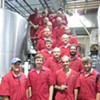Published July 18, 2007 at 3:41 p.m.
Ah, Vermont, land of the civil union, bluest of the blue states, where gay people flock to raise families and transgendered people are now protected from discrimination.
But if there’s a queer bar left in the state, someone should ask it to please come out of the closet.
After years of struggling for equality — and, some say, for assimilation — the Vermont gay, lesbian, bisexual and transgendered community (GLBT) finds itself at a cultural crossroads, asking: Has the gay bar become unnecessary here?
The venerable 135 Pearl in Burlington closed in the spring of 2006. Weeks earlier, Shooka Dooka’s in Rutland lost its lease and shut down. The Rainbow Cattle Company outside Brattleboro had closed a few years earlier.
On July 7, the Vermont queer community celebrated its 25th Pride Day in Burlington. In the absence of 135 Pearl — or Pearl’s, as many still call it — local straight clubs such as Higher Ground, Nectar’s, The Green Room and 1/2 Lounge all hosted Pride events this year. Some say this assimilation into the mainstream clubs means progress.
At first glance, it’s enough to make a queer all warm and fuzzy inside: straight clubs welcoming displaced gay patrons with open arms. Then again, business is business.
Shawn Lipenski is the health-and-wellness program director for R.U.1.2? Community Center and a queer event organizer. He’s behind the “1/2-Cocked” queer parties at 1/2 Lounge, and co-organizes the First Fridays for lesbians and their friends at Higher Ground with local musician Antara. Lipenski and Antara are also responsible for the “Cirque du So Gay” pride party at Higher Ground, which attracted more than 700 people.
Despite the success of these events, Lipenski and his party patrons want a true gay bar in town again. “People are definitely saying, ‘What the hell! Will someone please open a gay bar!’” he says.
***********
The bar has always been the epicenter of gay culture. Some have called it the one place queers can go, be themselves and feel safe. A recent spate of anti-gay incidents in the region may offer the most compelling argument that such a space is still vital to the community.
In February, conservative Vermont radio host Paul Beaudry launched a weeks-long diatribe against Outright Vermont, the queer youth advocacy group, for bringing its anti-bullying presentation to Missisquoi Valley Union High School in Swanton. In May, vandals threw bricks through four windows at R.U.1.2?, the gay community center in Burlington. Numerous hate crimes against individuals have been reported.
No wonder straight bars are redefining themselves as spaces where it’s safe to be openly queer. On Pride Day, Burlington’s Nectar’s hosted the first official “Bear” event, the Burly Bear Beer Blast. The Bear faction of the gay community is composed of bearded, sometimes large men: At Nectar’s, more than 100 Bears and their companions turned out.
Nectar’s owner Damon Brink believes the almighty dollar knows no sexuality. “I like to think that Nectar’s represents one of the higher and better ideals of capitalism,” he says. “Maybe even a pure ideal: that money is blind and that, all things being equal within the club — not society — everyone has the same opportunity for success and for defining success.”
Partners Mongo, 46, and Ivan Goguen, 43, of Randolph enjoyed the event, but say it’s not the same as having a gay space. “Assimilation is not the same as liberation,” Mongo explains. “We still need a safe space where you can be yourself and people will support you,” Goguen adds.
Bear event organizers and partners David Grenier and Chris Vaccaro agree. “Our identity is what makes us unique,” Grenier said. “To say we’re going to go to straight bars erodes our identity.”
“It is an interesting question,” Mongo adds.
“Why hasn’t this community been able to support a gay bar?” Goguen asks rhetorically.
***********
That’s an oft-posed question with no clear answer. Some cite apathy as the factor that has kept a gay club from sprouting in Burlington. Lluvia Mulvaney-Stanak is the executive director of Outright Vermont and a professional DJ. She used to spin at Pearl’s and now DJs regularly at Higher Ground’s First Fridays. Mulvaney-Stanak believes the queer community has been lulled into inaction since civil unions became law in 2000. “People don’t feel the need to be out and proud about their sexuality,” she says. “People don’t feel the need to go to Pride anymore.”
Then there are purely logistical issues. When asked if he has any advice for a prospective gay-bar proprietor, Higher Ground owner Alex Crothers offers a deadpan answer: “Run. It’s tough. It’s very difficult.” He cites hassles common to opening any club: “The margins are thin. It’s not a big population base, and there isn’t a ton of disposable income. There are a lot of rules and regulations. This is not the easiest place to do business.”
Some queers speak of a problem of “leadership fatigue.” Former 135 Pearl owner Robert Toms can relate. For years, the bar was the shining beacon of queer nightlife in Burlington. Homosexuals came from far and wide on the average Saturday night to meet and mingle, some driving for two or three hours.
After 13 years, Toms sold 135 Pearl last spring. It’s now a Papa John’s pizza restaurant. “I loved it,” Toms says, “and I mourn it on so many different levels, but I had to live for myself.”
Toms, 38, was only 23 when he took the reins at Pearl’s. He’s now focusing on his acting career. He says running the bar was rewarding but draining: “It was more community service. It was a struggle to keep it alive. It was borderline nonprofit.”
Pearl’s was known for being a bar for every type of queer, and Toms hopes that whoever opens the next gay club will bear that in mind. “It’s about respect, compassion, consideration and love for each other,” he says. “You can’t alienate. It’s about the whole spectrum.”
He also believes the appearance of another gay bar depends on the queer community. “People have to step back and take responsibility and say, ‘How can I fill this need?’” Toms says. “If there is a need, let it evolve.”
Some suggest that the community has outgrown the bar setting as the meeting place of choice. Many queers have quit drinking and doing drugs and now look for sober places to gather. The advent of Internet dating and special-interest clubs has made the bar less of a destination.
Queer Social Space Vermont (QSSVT) was formed last year in the wake of 135 Pearl closing to organize a queer coffeehouse collective in Burlington. The group has been working on a business plan and will soon be looking for space. The model? The Langdon Street Café in Montpelier. On its website, QSSVT asserts that it “does not accept that assimilation represents progress for Vermont’s diverse GLBT.”
Leslie Freeman-Dykesen is a lesbian activist, writer, mother of two and spokesperson for the QSSVT. “People are lulled into this perception that if the queer community can merge with the progressive mainstream, we won’t incur the disrespect of isolation in the way we have,” she says. “I’m really happy to see that queer space carved out in the mainstream, but it’s just not enough. It doesn’t represent progress. It doesn’t represent anything new or allow us to further ourselves.”
Freeman-Dykesen stresses that, while alcohol will be served at the coffeehouse, it will not be a “heavy-hitter. One of our goals is to have a space that is multigenerational, accessible to non-drinkers and accessible to the disabled,” she says. “We want to be by queers, for queers.”
***********
At the Cirque du So Gay event at Higher Ground on Pride night, young and old queers alike gathered for the 25th Pride celebration with “Vermont Drag Idol” and various musical acts.
Vicky Phillips, 48, of Underhill, has been out for 25 years and remembers when bars were more necessary. Today, she’d like to see an alternative. “There is a really high rate of alcoholism in this community,” she offers. “I would like to see events moved out of the bars.” Phillips suggests “bars are becoming less popular because gay people are more able to socialize without drinking. It’s much easier now.”
On the other end of the spectrum, some queer youth feel they lost out because Pearl’s closed before they came of age. “I feel robbed,” says Lauren Coppola, 22, of Essex. “I was a week shy of turning 21 when Pearl’s closed. I was looking forward to a big party.”
Bekki Bruno of Colchester, also 22, says younger queers don’t have the money or the know-how to open a gay venue. “I would love to open a gay bar, but it’s easier when someone else does the grunt work,” she admits.
Shouldn’t queer youth step up if the older generation is suffering from “leadership fatigue”?
“The best leaders lead from behind,” Mulvaney-Stanak says bluntly. “It’s harder and it takes longer, and that’s where we are. We need to take the time to teach people how to lead.”
Mulvaney-Stanak thinks the queer community needs to invest in itself: “It’s about knowing your neighbor, being local and having pride in where you live. That goes double for the gay community. People need to take responsibility for making a change.”
She believes homophobia is alive and well, especially outside metropolitan areas, making it hard for queers to socialize in the mainstream. “People are still battling basic stereotypes and the need for services,” Mulvaney-Stanak argues. “But there isn’t a huge public outcry anymore when homophobic acts and slurs occur.”
She pauses. “It’s not as bad as 30 years ago, but it’s not as good as they think it is.”
Cirque du So Gay
More By This Author
Speaking of Culture, glbt
-

Video: Musicians Jeremiah and Annemieke McLane Move into their New Home
Mar 24, 2022 -

Creating Art That Celebrates the Culture and Climate of Places Around the Globe
Jun 29, 2021 -

Video: Storyteller Ferene Paris Meyer Inspires a Juneteenth Mural
Jun 17, 2021 -

Arts and Culture Nonprofits to Receive $5 Million in State Relief Grants
Jul 7, 2020 -

18 Elm in Waterbury Creates Community at the Table
Jul 9, 2019 - More »
Comments
Comments are closed.
From 2014-2020, Seven Days allowed readers to comment on all stories posted on our website. While we've appreciated the suggestions and insights, right now Seven Days is prioritizing our core mission — producing high-quality, responsible local journalism — over moderating online debates between readers.
To criticize, correct or praise our reporting, please send us a letter to the editor or send us a tip. We’ll check it out and report the results.
Online comments may return when we have better tech tools for managing them. Thanks for reading.












































